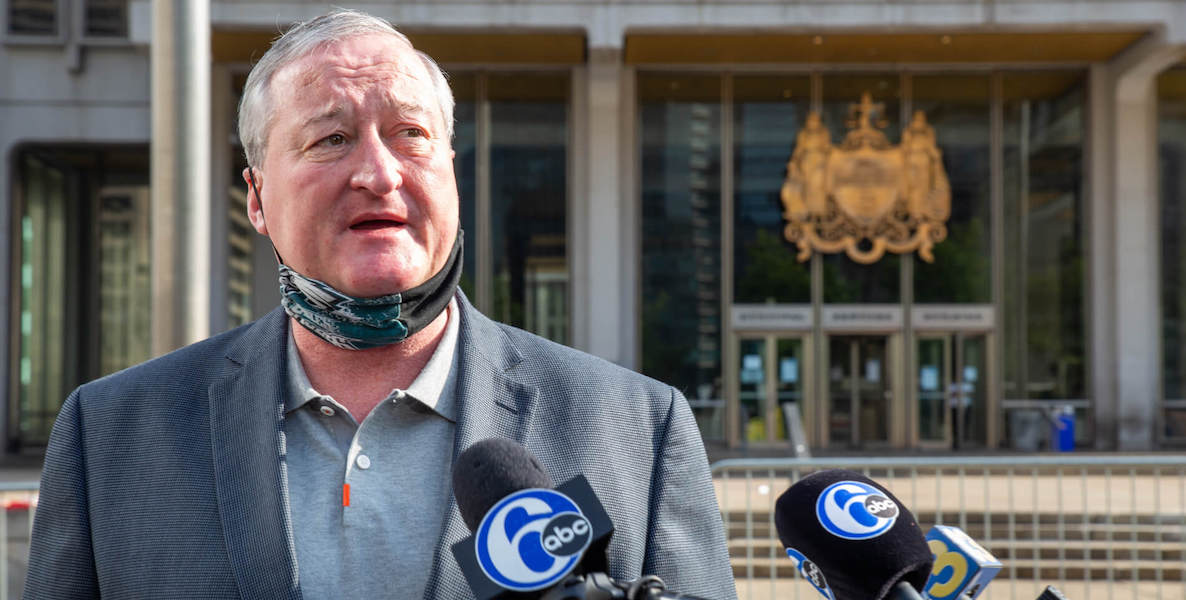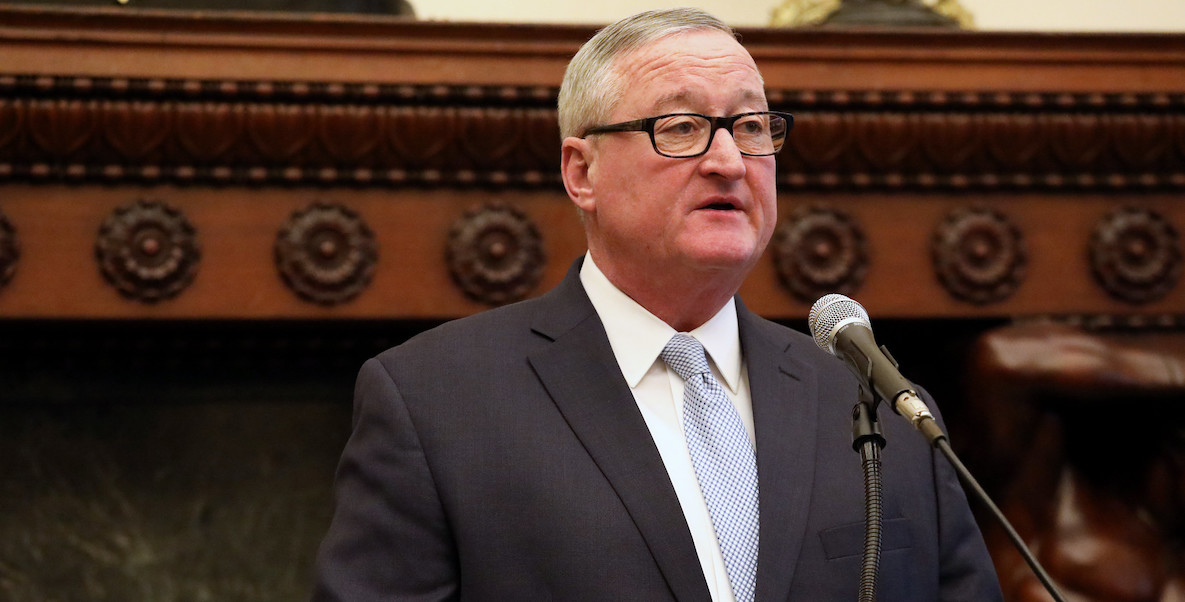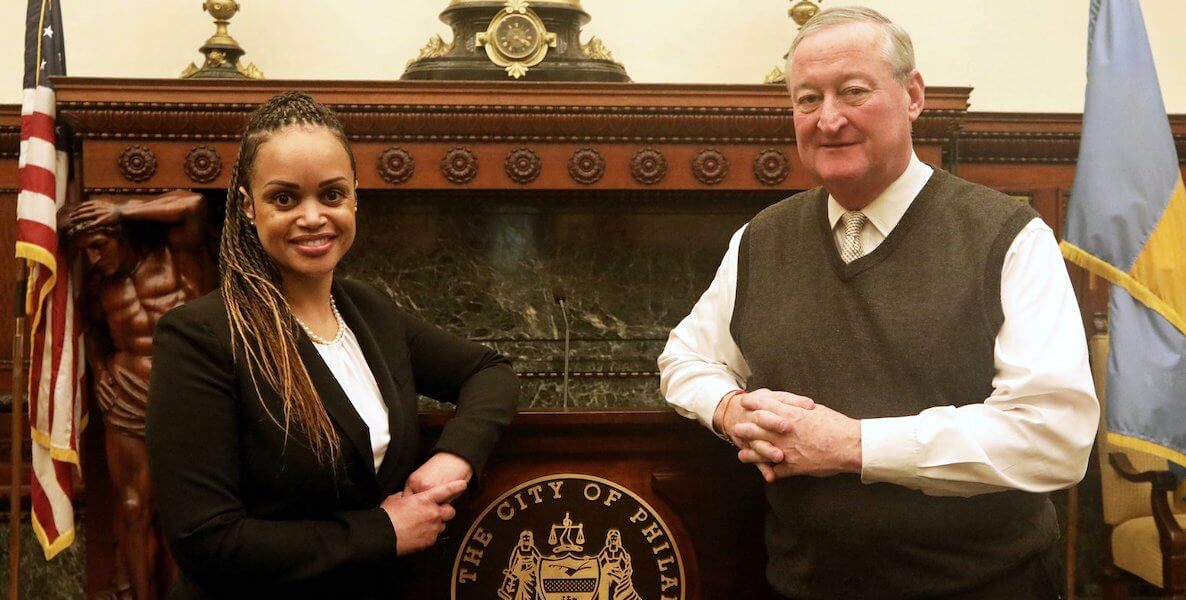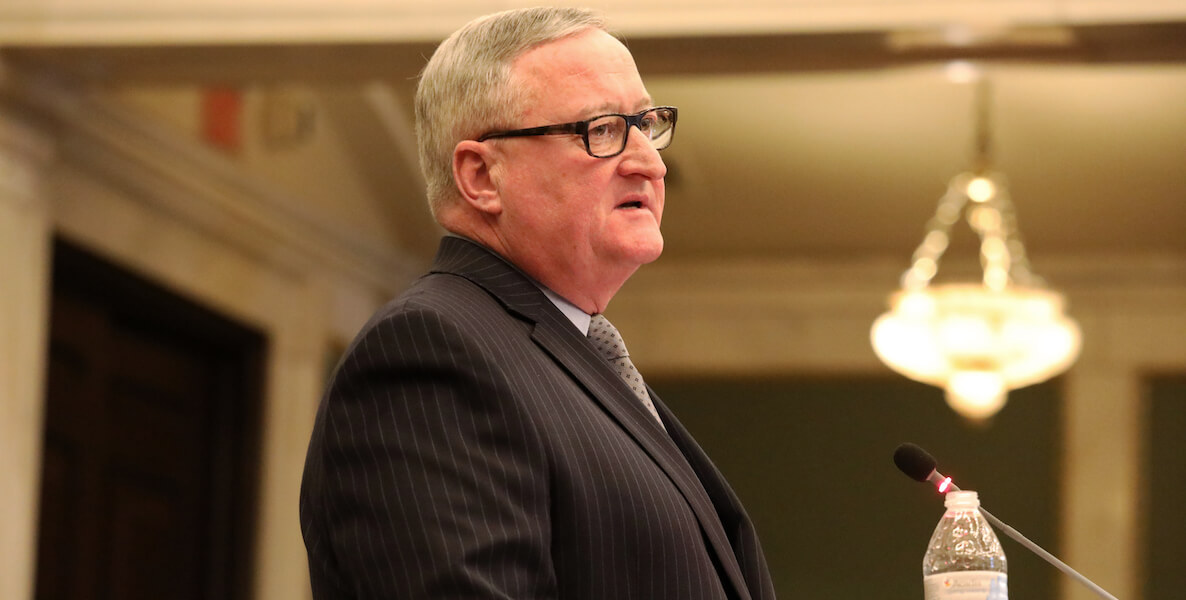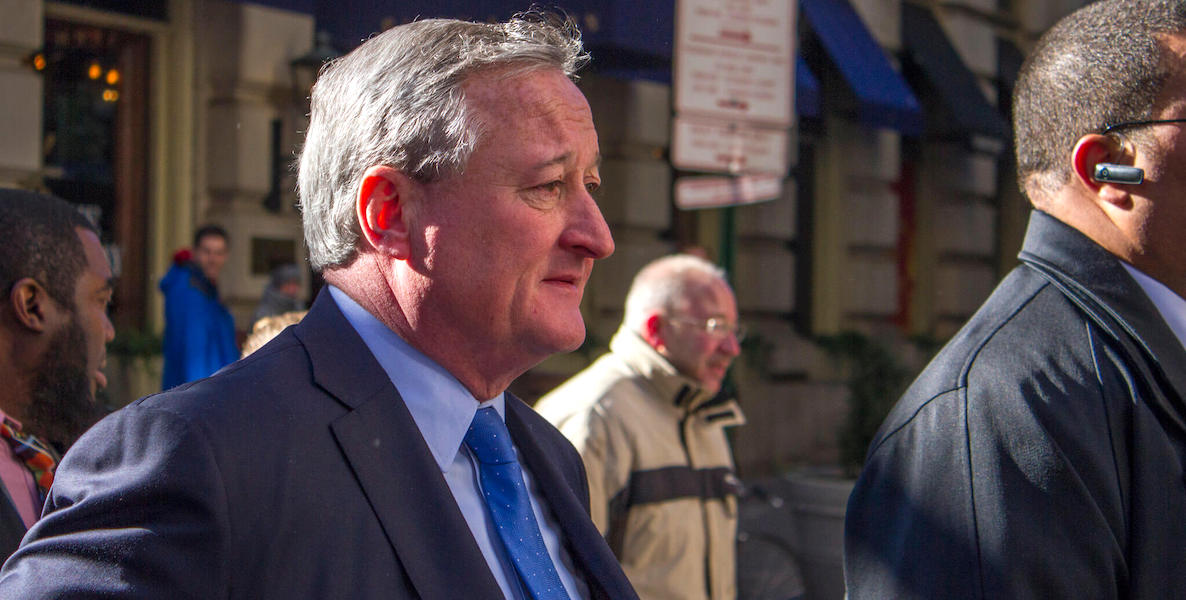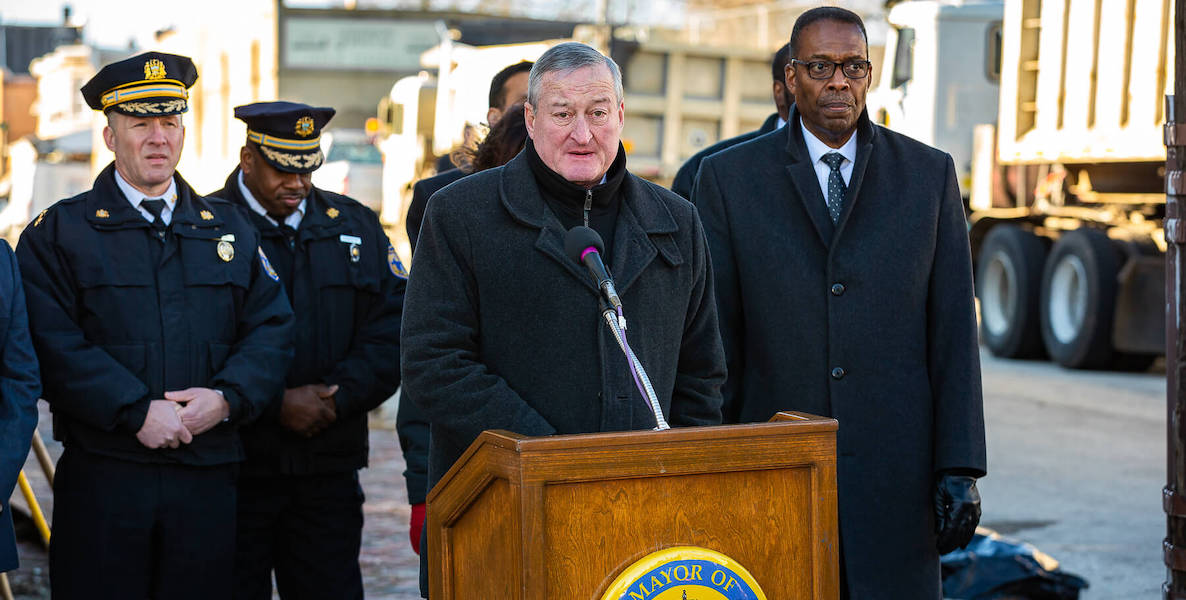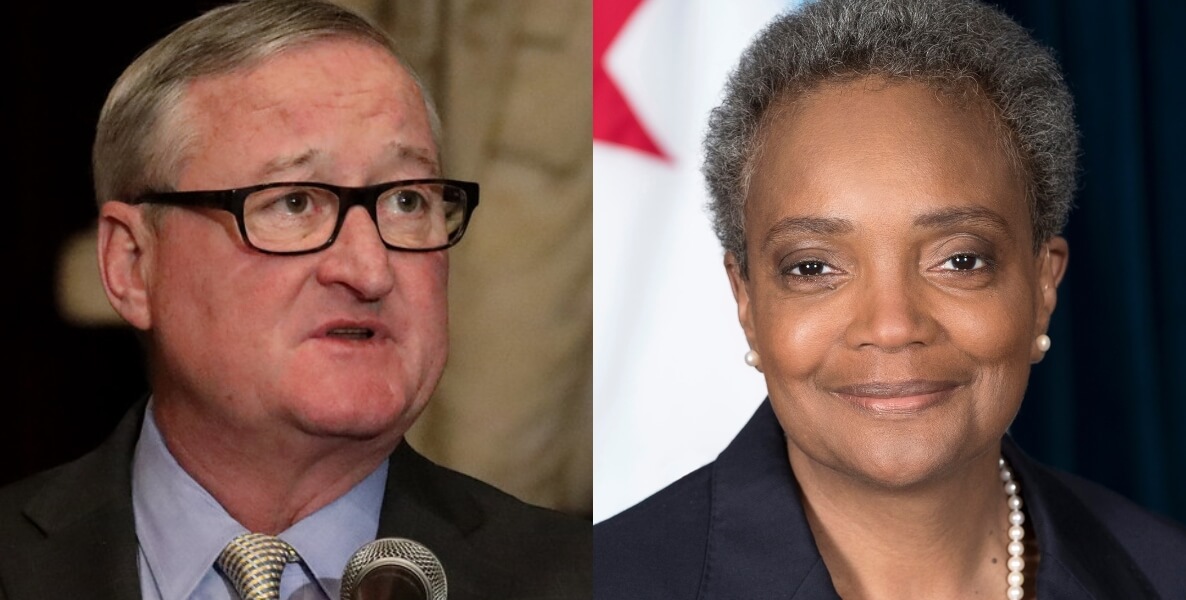“Progress is never permanent, will always be threatened, must be redoubled, restated and reimagined if it is to survive.”
![]() —Zadie Smith
—Zadie Smith
Even before a once-in-a-lifetime plague and a racial conflagration rocked our city, Philadelphia had the dubious distinction of having America’s most sour-faced mayor.
Jim Kenney would advertise to complete strangers in bars just how much he hated his job, and even other mayors would shake their heads at his antisocial ways; when a group of them descended on Philly to share notes on best practices, not only did Kenney refrain from joining them, he turned down their request for a guided tour of his city. (He offered to dispatch an aide to show them around, instead.)
So my heart goes out to the poor guy now that Covid, economic collapse and racial unrest have really turned his job into a 24-7 suck-a-thon. In recent interviews, he’s taken pains to proclaim himself “optimistic,” but his dour, tight-lipped body language and not-so-private complaining belies the spin.
It’s all well and good for Jim Kenney, private citizen, to be down in the dumps, but a city needs its leader to exude a sense of possibility, particularly in times of crisis. A mayor who wishes publicly for this year to end might capture our angst, but does little to galvanize our hope.
![]() So, because I’m here to serve, here are three New Year’s resolutions we need our mayor to take—and see through. The last two are policy-oriented; rather than passively waiting to be bailed out by the federal or state governments, they would demonstrate that we’re capable of taking action and solving our own problems without asking anyone’s permission.
So, because I’m here to serve, here are three New Year’s resolutions we need our mayor to take—and see through. The last two are policy-oriented; rather than passively waiting to be bailed out by the federal or state governments, they would demonstrate that we’re capable of taking action and solving our own problems without asking anyone’s permission.
But first, let’s consider …
Resolution #1: The Mayor’s Spiritual Realignment
Watch and listen to Jim Kenney, and the diagnosis is front and center even to the most wannabe of psych majors. The guy is a prisoner to the voice in his head, the one telling himself a narrative about how bad things are, for him and, by extension, for us.
“When you recognize that there is a voice in your head that pretends to be you and never stops speaking, you are awakening out of your unconscious identification with the stream of thinking,” writes the brilliant Zen philosopher Eckhart Tolle. “When you notice that voice, you realize that who you are is not the voice—the thinker—but the one who is aware of it.”
So, be it resolved: In 2021, Jim Kenney will become aware of the chattering voice of negativity in his head. When he begins to discard such negativity, he’ll be free to tell us a different story about what we’re up against—one characterized by straight talk, a comforting smile, and a plan that maps out our comeback.
Which gets us to …
Resolution #2: A Local Stimulus Payment
Kenney’s plan, accompanied by his new can-do attitude, ought to take a page from other mayors and acknowledge that no one is coming to save us. We are the answer we’ve been waiting for.
That’s what Mayor Muriel Bowser did in Washington, D.C. While Congress and the denier-in-chief wrestled over minutiae, imperiling for months the passage of a Covid-19 relief package, Bowser distributed $1,200 relief checks to about 20,000 unemployed Washingtonians in need, like gig and digital economy workers, the self-employed, and contractors. She redirected leftover funds from the federal CARES Act to pay for it.
We are a city in desperate need of some hope, man.
Imagine if Jim Kenney did something like that here. Government actually delivering into its citizens’ pockets a lump sum payment just when they need it the most, and beating Trump and Congress to the punch?
It would say we can get things done here. We can solve our own problems. It would make Jim Kenney, one-time complainer, a can-do mayor.
Ditto …
Resolution #3: A Philadelphia Civilian Conservation Corps
This year, leaders in Austin, Texas, resurrected a storied New Deal program to help their most vulnerable citizens during the pandemic and economic tsunami.
They launched the Austin Civilian Conservation Corps, modeled after FDR’s program of the same name during the Great Depression that put more than 2.5 million men to work in 4,500 camps across the country beginning in 1933. They planted over 3 billion trees, combated soil erosion and forest fires, and battled natural disasters like hurricanes, floods and droughts.
It was an unprecedented experiment in federal relief work, and Austin has shaped a local program in its image, if not its scope. The Austin experiment is still embryonic, with a mere $2 million budget—culled from loose change found in a multitude of city departments. That’s good enough for about 60 jobs at $15 an hour, cleaning up parks and trails, planting trees, and installing solar panels.
“We’re really excited and hopeful and enthusiastic about helping people get into conservation fields, gain more employment, help make Austin a better, greener place and address the coronavirus pandemic in a way that’s uplifting and forward-looking,” said Daniel Culotta, portfolio manager for Austin’s Innovation Office.
(Note to Mayor Kenney: See how Culotta did that? Constructed a relentlessly positive, can-do message at a time when his constituents just might be freaking out? No voice in the head, there!)
Why not borrow from Austin, and unveil a Philly Conservation Corps? Eleven percent of our population is unemployed. Why not put them to work, cleaning and greening the city?
![]() At least one civic leader pitched just this idea to Kenney early in the pandemic, and the answer predictably came back: There’s no money in the ever-shrinking budget for it. No doubt, the answer would be the same for local stimulus payments.
At least one civic leader pitched just this idea to Kenney early in the pandemic, and the answer predictably came back: There’s no money in the ever-shrinking budget for it. No doubt, the answer would be the same for local stimulus payments.
Here, of course, is where the aperture of the governmental lens needs to widen. Do we really not have the money for such working-class relief efforts, or do we lack the political will to reorder priorities during a crisis? After all, despite the crisis, the mayor’s funding of his treasured Pre-K and Rebuild programs remains sacrosanct.
Moreover, isn’t it faulty to think of stimulus checks and a local CCC work program just in terms of expenditure? Aren’t they also investments in increasing demand, thereby ultimately growing the tax base? Besides, if you really wanted it—like you wanted to pay for pre-K—you could find the money.
I’ve written before about how cities leave money on the table. Cities in Northern Europe provide a road map for how to leverage city assets into much-needed public investments, as laid out in The Public Wealth of Cities: How To Unlock Hidden Assets to Boost Growth and Prosperity, by Dag Detter and Stefan Fölster.
“In Copenhagen and Hamburg, they have public asset corporations, public- or privately owned and publicly managed institutions that are able to take all the land owned by the government—city, county, state, port authority, airport authority, stadium authority, redevelopment authority—and put it into one corporate vehicle and get the revenue from the disposition of that publicly owned land to invest in infrastructure, innovation, inclusion,” explains Bruce Katz, Citizen contributor and director of the Nowak Metro Finance Lab at Drexel University. “We act like we’re poor. We’re not.”
While it tickles me to think of Jim Kenney widening his circle of advisers to include Eckhart Tolle, the point here is a serious one. For an example of how a mayor can marshall a city toward hope by leading through empathy and candid storytelling, spend 275 minutes (!) viewing City Hall, the documentary by legendary filmmaker Frederick Wiseman, which chronicles Boston Mayor Marty Walsh.
Jim Kenney spent his first term as, essentially, a caretaker mayor. Despite our seemingly intractable problems, he governed incrementally. But now we’re in crisis, and a lack of imagination in leadership runs the risk of letting a good crisis go to waste.
“Mah-ty,” as he refers to himself, might at first take be seen as a Kenney clone. Like Kenney, he is an Irish-Catholic big city liberal, no technocrat or policy wonk. But, unlike Kenney, whose daily schedule is often a blank slate, Walsh is everywhere, every day. At civic meetings or internal budget meetings, he leads by listening, and by speaking candidly of his own vulnerabilities. Standing before audiences of strangers, Walsh weaves tales of his cancer battle as a kid and his own alcoholism into object lessons for the city he leads.
When Walsh talks about moments in his life that tested his resilience, his constituents pay rapt, wide-eyed attention. Their elected leader is telling them, in effect: Tomorrow will be better than today.
At our recently concluded Ideas We Should Steal Festival, hope felt rampant: We heard amazing Philly kids sing; we heard from civic leaders in other cities who have modeled the art of collaboration and listening as the keys to spurring radical change; and we heard from capitalist masters of the universe about how inclusion is the ultimate growth model. We heard young mayors say they’re in the customer service business, and we heard longtime cops hold forth on reforming the police by making warrior culture a thing of the past.
It was thrilling. But the next morning, we woke up in a city that still has a lot of metrics working against it: The worst poverty and highest taxes in the nation, a murder rate that’s exploding, high unemployment, a low-skilled workforce. We are a city in desperate need of some hope, man.
Jim Kenney spent his first term as, essentially, a caretaker mayor. Despite our seemingly intractable problems, he governed incrementally. But now we’re in crisis, and a lack of imagination in leadership runs the risk of letting a good crisis go to waste.
That’s what then-Senator John F. Kennedy was getting at in his stirring 1959 remarks at the convocation of the United Negro College Fund in Indianapolis: “When written in Chinese, the word ‘crisis’ is composed of two characters—one represents danger and one represents opportunity,” he said.
![]() Kennedy seemed to suggest that, throughout our history, times of crisis have always sparked a heightened appetite for big ideas. Think of it: FDR’s social programs, LBJ’s civil rights laws and even George W. Bush’s creation of the Department of Homeland Security were all examples, to varying degrees, of leadership in uncertain times striving to meet its moment with boldness and ingenuity.
Kennedy seemed to suggest that, throughout our history, times of crisis have always sparked a heightened appetite for big ideas. Think of it: FDR’s social programs, LBJ’s civil rights laws and even George W. Bush’s creation of the Department of Homeland Security were all examples, to varying degrees, of leadership in uncertain times striving to meet its moment with boldness and ingenuity.
That’s the moment we need Jim Kenney to rise to.
There are those who say it’s not in his DNA, but history is replete with examples of ordinary men and women who do extraordinary things when the stakes rise to existential levels; look no further than Walsh in Boston, or the failed haberdasher who remade America and the world out of the rubble of World War II.
We need from Jim Kenney proof that someone is, as Zadie Smith says, reimagining progress in this moment.
Header photo courtesy Philadelphia City Council / Flickr


